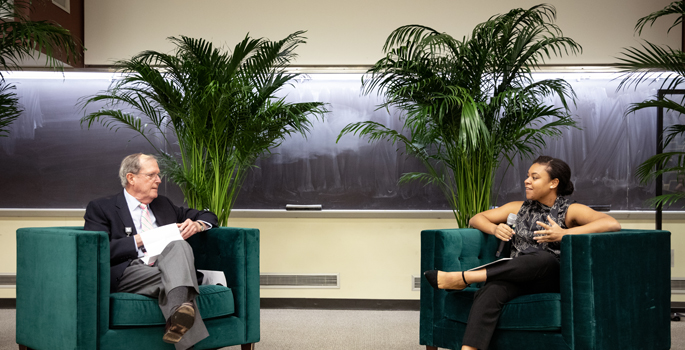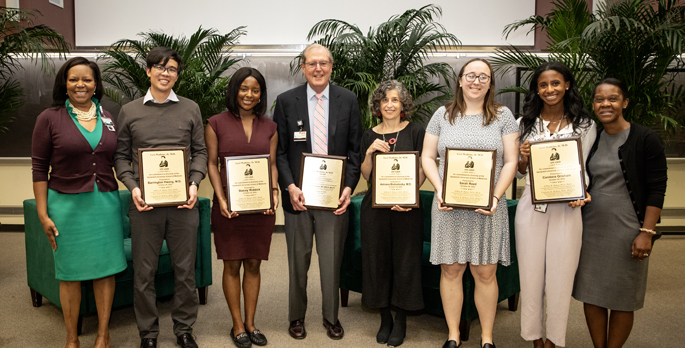
The 22nd annual Levi Watkins Jr. MD Lecture was held on Oct. 24, honoring Watkins, who was the first African American to graduate from Vanderbilt University School of Medicine (Class of 1970), and recognizing the contributions of several Vanderbilt faculty, trainees and students who have made contributions to diversity, equity and inclusion.
“Dr. Watkins’ legacy is one that is deeply instilled in our School of Medicine and Medical Center in part because … of the barriers he broke 60 years ago, but also since that time,” said Consuelo Wilkins, MD, MSCI, Senior Vice President and Senior Associate Dean for Health Equity and Inclusive Excellence, in welcoming those gathered in Light Hall and watching via livestream.
“After Dr. Watkins left us and went on to Johns Hopkins, he continued to come back and pour into Vanderbilt University, and if you spent any amount of time with him, it was very clear how passionate he was about equity, justice and making sure people from marginalized and minoritized groups had the opportunity to thrive.”

The program featured a conversation between John Sergent, MD, MACP, MACR, vice chair emeritus for Education, Department of Medicine, and associate director, internal medicine residency program, and Kianna Jackson, MD, a fourth-year plastic surgery resident and the 2020 Founder’s Medalist for the School of Medicine. Sergent and Jackson participated in “A Conversation on Race, Training and Care at Vanderbilt.”
Sergent said he realized early in his life that “separate but equal” was a flawed concept when his Frankfort, Kentucky, high school desegregated during his junior year.
“We went from all-white to maybe 10-15% Black. When we desegrated at Frankfort High School, I can tell you, it was anything but ‘separate but equal,’” he recalled. “That was my first exposure to going to an integrated school.”
Sergent arrived as an undergraduate at Vanderbilt University in 1959 and was witness to early efforts of activist and Vanderbilt University Divinity School student James Lawson to organize nonviolent, sit-in protests of Nashville’s segregation policies. Lawson was expelled for his actions, and protests erupted across the University.
“James Lawson was one of the most remarkable people I’ve ever known,” Sergent said. “This was my first year in college. It gnawed away at me that I saw this going on and didn’t do anything about it.”
That would change during the fall of 1961 when Sergent was elected to the VU student senate and proposed a bill that would recommend to the board of trust to desegregate all of the University’s schools, including the medical school. The bill failed by one vote. He then proposed that there be a referendum and a debate open to the student body. His proposal had the support of student newspaper editor and future Tennessee governor, Lamar Alexander, and classmate and writer Roy Blount Jr. The referendum failed to pass by 200 votes. However, two months later, the board of directors voted to desegregate the entire university.
Sergent was admitted to VUSM in 1962, and a year after he graduated and left to do his residency at Johns Hopkins, Watkins became the first African American admitted to VUSM.
The two trailblazers crossed paths later in their careers.
“I found Levi to be charming, a kind person, who was very easy to talk to and know,” Sergent said. “He loved Vanderbilt. If he were alive, he’d say, ‘We’re not there, but we’re coming along.’”
Kimberly Vinson, MD, holder of the Directorship for Diversity, Equity and Inclusion in Otolaryngology – Head and Neck Surgery, recognized the following faculty and students for their efforts in diversity, equity and inclusion:
Medical Student Award:
Sarah Reed
Candace Grisham
Housestaff Award:
Barrington Hwang, MD
Faculty Award:
Adriana Bialostozky, MD
Graduate Student Award:
Stacey Riddick












